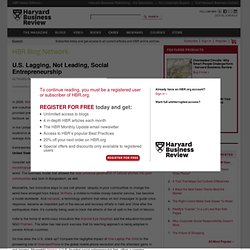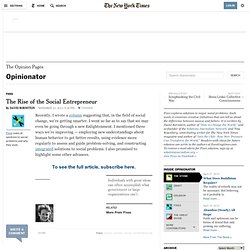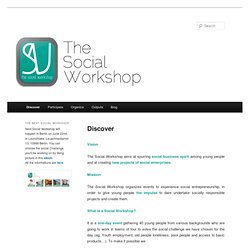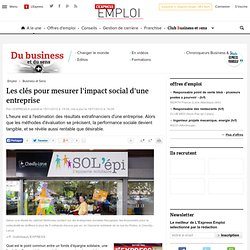

U.S. Lagging, Not Leading, Social Entrepreneurship - Timothy Ogden. By Timothy Ogden | 10:53 AM June 29, 2010 In 2009, William Kamkwamba, a teenager from Malawi, made the rounds on American talk shows and coauthored a best-selling book.

The source of his notoriety? A homemade windmill that provided power and running water for his family. Kamkwamba built it from trash, using an old textbook as his only guide. In the United States, the idea of deploying small-scale windmills had been abandoned as too expensive and horribly inefficient. Kamkwamba’s story points to an unrecognized truth of social entrepreneurship and innovation.
Consider some of the most important social innovations of the past 20 years. Meanwhile, two innovative ways to use cell phones’ ubiquity in poor communities to change the world have emerged from Kenya: M-Pesa, a mobile-to-mobile money-transfer service, has become a model worldwide. India is the home of world-class innovators like Aravind Eye Hospitals and the education-focused NGO Pratham.
So how does the U.S. stack up? What Exactly Is a Social Entrepreneur. I understand social. I understand entrepreneur. But when you put the two words together, I have to pause. Rod Shrader: Social Entrepreneurship Growing Despite (or Perhaps Because of?) Economic Challenges. Interesting things happen at the intersection of the Great Recession and the aspirations of the Millennial Generation.

They are the young people I see every day in my work at the Institute for Entrepreneurial Studies at UIC and what I am observing will stand the "greed is good" philosophy on its head. For the most part, my students come from Chicago and many of them represent the first generation in their families to attend college.
They arrive with an entrepreneurial spirit and are the ones most likely to look at a turbulent economy and say, "How can I make sense of this and make a living at the same time? " It has led to an interesting hybrid -- students who want to use the tools of entrepreneurship to help improve conditions in society and earn a living doing so. Enter the social entrepreneur. Not Everyone Should Be a Social Entrepreneur - Lara Galinsky. “I want to be a social entrepreneur.”

I hear it nearly every day. Not just from those applying for Echoing Green’s social entrepreneurship fellowship, but from high school students, college students, and young professionals. They excitedly tell me that they want to launch organizations to improve education in Africa, to better the livelihood of women in inner city Chicago, or solve any number of other big problems. It’s clear that this field has captured the imagination of the Millennial generation. From Babson to Berkeley, students today can take a variety of courses on social entrepreneurship, minor in the subject, and will soon be able to major in it. You would think as someone who works in an organization that promotes the social entrepreneurship movement, I would be happy about this explosion in popularity. Bill Drayton's Five Trends For Social Entrepreneurs. 2013: What's Ahead For Social Entrepreneurship.
Social Entrepreneurship Predictions for 2013. The Rise of the Social Entrepreneur. Fixes looks at solutions to social problems and why they work.

Recently, I wrote a column suggesting that, in the field of social change, we’re getting smarter. I went so far as to say that we may even be going through a new Enlightenment. I mentioned three ways we’re improving — employing new understandings about human behavior to get better results, using evidence more regularly to assess and guide problem-solving, and constructing integrated solutions to social problems. I also promised to highlight some other advances. Individuals with great ideas can often accomplish what government or large organizations can’t. Today, I’m focusing on a key innovation that underlies much of these gains: the recognition of the role played by entrepreneurs in advancing positive social changes. At times, it can be hard to believe that progress is happening.
But the rhetoric of a political campaign is misleading. What happened to spark these changes around the world? Knowable.org - connecting makers. worldwide. The Social Workshop. Vision.

Accueil. Les clés pour mesurer l'impact social d'une entreprise. Quel est le point commun entre un fonds d'épargne solidaire, une fondation finançant des associations, une entreprise sociale ou un grand groupe décidant de lancer un produit à destination des plus pauvres?

Ils sont tous à la recherche d'un impact social positif. Et si l'on en croit le fameux adage "On ne gère bien que ce que l'on mesure", tous ont intérêt à savoir évaluer la valeur sociale ajoutée de leur activité. "Aujourd'hui, contrairement à quelques années plus tôt, l'idée qu'il est indispensable de mesurer son impact pour toute activité à finalité sociale fait consensus, observe Judith Jakubowicz, coordinatrice générale de Convergences 2015.
Mais, sur le terrain, la mise en oeuvre concrète est loin d'être généralisée. " Efficacité de l'action et des fonds investis Car, pour les acteurs de l'économie sociale et solidaire (ESS), la mesure de l'impact représente un enjeu majeur de professionnalisation. Standardisation des méthodes par secteur.